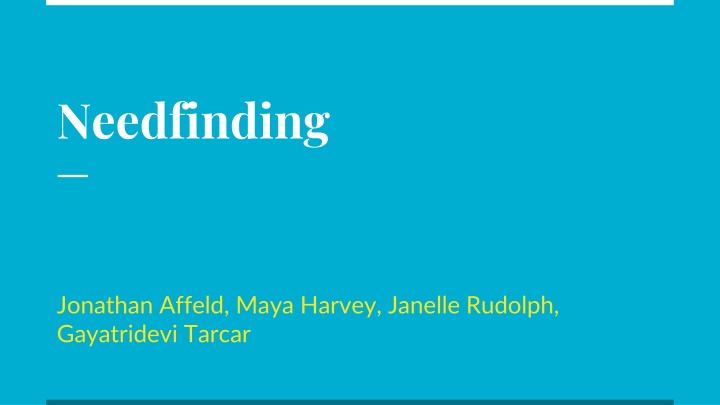
Hidden Health Challenges in Unique Communities
Explore the world of individuals with unique medical histories within their communities. Uncover the hidden disabilities affecting their interactions and support systems. Learn about personal stories and strategies for accommodating diverse health backgrounds.
Download Presentation

Please find below an Image/Link to download the presentation.
The content on the website is provided AS IS for your information and personal use only. It may not be sold, licensed, or shared on other websites without obtaining consent from the author. If you encounter any issues during the download, it is possible that the publisher has removed the file from their server.
You are allowed to download the files provided on this website for personal or commercial use, subject to the condition that they are used lawfully. All files are the property of their respective owners.
The content on the website is provided AS IS for your information and personal use only. It may not be sold, licensed, or shared on other websites without obtaining consent from the author.
E N D
Presentation Transcript
Needfinding Jonathan Affeld, Maya Harvey, Janelle Rudolph, Gayatridevi Tarcar
Domain People with unique medical histories that differ from their immediate community Why? What goes on behind the scenes in the medical lives of seemingly normal people? How do these hidden disabilities affect the way people interact with strangers and their community?
Participants - Female, 3rd year psychology student Lives with anxiety, panic attacks, overthinking Personal connection to team member -lives in a very different community - - Female, high school sophomore Currently lives with juvenile epilepsy Personal connection to a team member - 1 3 - - - - - - Male, college athlete Had brain tumor Currently lives with deafness in one ear Personal connection to a team member Extreme user due to multiple unique health challenges and is receiving ongoing treatment - - Male, college athletic coach Has family members with healthcare challenges Works daily with athletes who have physical limitations Met at Jimmy V s (campus cafe) Non-user, has no direct medical challenges - 2 4 - - - -
Interview Logistics Participant 1 was interviewed in person (Maya interviewer, Jonathan transcriber). Participant 2 was interviewed in person (Maya interviewer/transcriber) on UC Berkeley campus. Participant 3 was interviewed via Zoom (Gaya interviewer, Maya transcriber). Participant 4 was interviewed in person (Jonathan interviewer, Janelle transcriber) at a Stanford Cafe. Apparatuses used included laptops and iPad to take notes and transcribe interviews.
Questions Asked How do people compensate for having a disability/strategies used for accommodating them? Tell me about a time you experienced issues with accessing healthcare? Was there ever a time where you found healthcare support in your community? Was there a time when your community was lacking in healthcare? Have you ever felt isolated by your medical history? And/Or what has helped you overcome that? Do you feel adequately supported for your health, mental and physical? Why? Was there any challenge in your life that a disability or health issue has impacted? What unique challenges or experiences have your health issues brought into your life? What tactics have you used to accommodate people with different medical backgrounds than you?
Key Quotes Community is way more important than medical care - Participant 1 [you] have to try and understand what people are going through, but not let it affect you - Participant 3 a lot of people in [my] current community don t know [I] had a brain tumor - Participant 2 Gone through the hardest of the hard - Participant 2 Google can help or make things worse. What really helps [with stress and anxiety] is talking to others and seeking community - Participant 4
Surprises? - Majority of participants seemed to suggest of their own volition finding community as method for dealing with isolation and healthcare challenges Can also be extremely stressful for non-users to perceive the healthcare challenges that users deal with Human body, mind, spirit is extremely resilient Some people that one might think are obligated to help individuals with healthcare concerns (i.e. parents) may actually obstruct access to healthcare Sometimes change of environment is significant help for increasing healthcare access - - - -
Analysis - Key Insights - - - - Fear stigma and how people will react greatly affects openness Young people and children seem less likely to report symptoms More people suffer than meets the eye Community can be helpful for recovery, but often it is hard to reach
Analysis - Key Insights - Health and opinions of loved ones impacts own mental health Location impacts access to health care Community can be impactful in recovery Fact discovery does not always quell anxiety - - -
Summary What s Next? Key Learnings: - How do we establish a form of community to bring together individuals with unique health concerns? How do we connect these communities to healthcare specialists so they can have adequate healthcare access? Or, how might we notify their personal communities of their situation to make living more comfortable? How do we make sure this form of community is accessible to all in the first place? - Finding community is both a key coping mechanism and method of achieving greater access to healthcare While workarounds can help make the best of a situation, real help is needed There is a wide variety of access to healthcare consistency and cost Younger people who cannot identify what they are going through struggle with identifying with a group after diagnosis - - - - -
